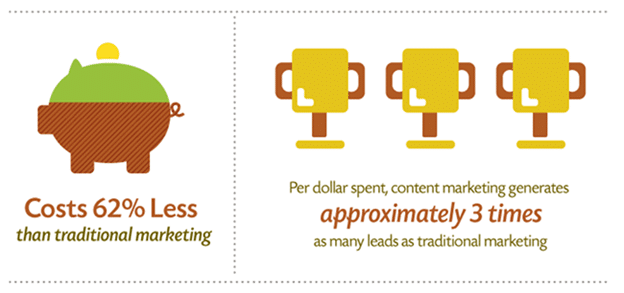
At Marketing Insider Group (MIG), we are well-versed in the realms of blogging and content marketing. If you are on the quest for the perfect blogging platform, look no further.
Blogging remains a potent tool for self-promotion, boasting a remarkable ROI with minimal investment. Research indicates that companies with active blogs witness a 67% increase in lead generation compared to those without.
To achieve success, your blog must be impeccably designed and function seamlessly. Explore our curated list of top-notch blogging platforms to find the one that suits your requirements.

Key Considerations for Identifying the Optimal Blogging Platform
When making your selection, budget is a primary consideration. Investing in a quality blogging platform often costs less than your weekly fast-food splurge.
For serious content marketers, free plans may not suffice. Just as you would invest in a physical storefront for visibility, consider allocating resources to enhance your online presence.

Furthermore, focusing on essential features that facilitate audience growth is crucial. Look for platforms that support SEO plugins, seamless third-party integrations, and robust analytics tools.
Scalability is another vital aspect to evaluate. Your chosen platform should be equipped to handle a sudden surge in traffic if your content goes viral.
Opting for a reliable platform ensures adaptability to future demands, sparing you the headache of migrating to a new system down the line.
Here is a rundown of leading blogging services to aid your decision-making process.
WordPress: The Unrivaled Blogging Platform
When it comes to blogging platforms, WordPress consistently reigns supreme. Offering unparalleled control over your content, WordPress facilitates seamless expansion possibilities.
Notably, WordPress stands as the most popular website builder, trusted by MIG and 43% of internet users worldwide.


It's crucial to differentiate between WordPress.org and WordPress.com. While the latter caters to beginners, the former offers enhanced features and capabilities.
For those looking to transition from WordPress.com to WordPress.org, refer to this informative video guide.
Setting up your blog on WordPress may necessitate some coding skills or the assistance of a seasoned developer. While initial costs may be higher, most businesses ultimately migrate to WordPress for its robust functionality and support.
Blogger
Popular among hobbyist bloggers, Blogger serves as a user-friendly platform ideal for non-monetized blogging endeavors.

With a simple setup process that requires linking your Google account, Blogger offers a hassle-free entry into the blogging sphere.
If your goal is to create a basic blog without elaborate features, Blogger presents a suitable option.
Wix
For beginners seeking to construct websites independently, Wix emerges as the go-to platform. While the free plan offers limited features, upgrading to paid options unlocks additional functionalities.
Although costs may escalate post the first year, many users find the convenience of Wix worth the investment. Serious content marketers, however, often transition to WordPress for enhanced capabilities.
Medium
Catering to writers aspiring to earn through their craft, Medium curates content based on topics and authors. While it aids in gaining exposure, Medium may not be the ideal platform for content marketing endeavors.
Redirecting readers to your website from Medium is imperative to channel traffic effectively.
CMS Hub
Exclusively designed for marketers, CMS Hub by Hubspot integrates a suite of marketing and customer service solutions. This platform boasts advanced features such as comprehensive analytics and adaptive testing capabilities.
Noteworthy is the adaptive testing feature that compares multiple page variations and displays the best-performing content to visitors automatically.
Despite its steep learning curve and higher pricing, CMS Hub stands out for marketers willing to invest time in leveraging its full potential.

With a myriad of blogging platforms at your disposal, it's time to kickstart your blogging journey!
Mastering Blogging: Best Practices for Success
Embark on a successful blogging journey by adhering to these essential practices:
- Consistent posting is key to building traction. Aim for two to four posts weekly for optimal engagement.
- Ensure blog security through robust passwords and multifactor authentication. Additionally, safeguard your data with a domain privacy service and a clear privacy policy.
- Optimize your blog with SEO by integrating relevant keywords and topics into high-quality content.
- Strategically time your posts for maximum impact. Weekdays and early mornings typically yield better results than weekends and late afternoons.
- Maintain a realistic content calendar to uphold a consistent posting schedule. Consider outsourcing to an agency if time constraints hinder in-house content creation.
While the best blogging platform sets the stage for success, instant virality is a rarity. Building a successful blog necessitates dedication and patience, akin to a long-term investment.
Content marketing, unlike gambling, yields predictable results over time. Consistency and perseverance are pivotal to achieving desired outcomes.

Consistent Content Creation on the Premier Blogging Platform
A superior blogging platform thrives on a steady stream of content. How can you ensure a consistent flow of high-quality material for your audience?
Marketing Insider Group stands ready to assist. Partner with us to craft a robust content marketing strategy that propels your blog to new heights.
Frequently Asked Questions
What are 5 marketing concepts you should know?
These are the five marketing concepts:
- Branding – A brand is an image that people have for you. It's what people associate with you when they hear your name. You must create a consistent brand identity across all media.
- Positioning – How you position yourself in your market. What are you describing about yourself and why should others care?
- Message- This is your message's main content. What is the point of your message? Why should anyone buy from you?
- Marketing mix – This includes channels, pricing, promotions, and other marketing tools that help you reach your target audience.
- Measurability – How can you measure your success?
What are the 7 steps of internet marketing strategy?
Internet marketing strategies are used for achieving business goals using online media. These seven steps are planning, research and implementation. Monitoring, analysis, optimization, optimization, and evaluation are the key components. Each step is essential for effective internet marketing and should be performed regularly.
- Planning – This step involves identifying who your target audience is and creating a plan of how to reach them. Also, think about who might be interested in your product or service.
- You can use research to understand the needs and interests of your customers so that you can choose the products or services that best meet their needs. Research also provides valuable insights into trends and consumer behavior.
- The first step in implementing your campaign is to select a platform (e.g. Facebook), and then determine where to place your ads. Once you've selected the platform(s), make sure they're properly configured. Decide whether to spend money on advertising or pay per-click.
- Monitoring – This is how you can see if your efforts have been successful. Use analytics tools like Google Analytics to track traffic flows, conversion rates, and customer demographics.
- This allows you compare results to benchmarks as well as previous performance levels. If you find areas underperforming, this step guides how to improve.
- Optimization – Optimizing your site means making changes to increase its efficiency in attracting visitors. You can add new features or alter how users navigate through your site.
- Evaluation – This is where you can assess how your campaign is performing. Do you see any areas for improvement? If not, you may not have reached your goals. If you still have issues to resolve, you will need another evaluation.
What is the difference between advertising and marketing?
Advertising is a communication method that promotes products or brands. Advertising has a clear call of action. For example, “Buy now!” Click here or “Buy Now!”
Marketing is another way to communicate the mission, vision and values of your company to potential customers. Marketing helps you build relationships with your current customers as well as prospects.
Online sales of shoes can be a great example of marketing. You may use marketing to tell a story about you and what you have to offer. You could talk about your history, philosophy, and commitment to quality. You could also share testimonials from customers who are satisfied with your products. To encourage people to visit your site, you could also create an event that gives away shoes free of charge.
Marketing is all about telling stories. Advertising is about selling products.
What is an example of search engine marketing?
Search Engine Marketing (SEM) is one of the most essential components of digital marketing. SEM encompasses paid-per click advertising, sponsored link, display ads (paid inclusion), search engine optimization(SEO), social marketing, video marketing and mobile advertising.
Statistics
- From 2020 to 2022, eMarketer predicts that digital marketing will grow by 36% and take up 54% of marketing budgets! (marketinginsidergroup.com)
- Meanwhile, a PartnerPath poll found that co-marketed ads help 68% of consumers arrive at a buying decision before even speaking to a salesperson. (influencermarketinghub.com)
- This allows us to deliver CPCs that are 80% less than average and CTRs 4-5 times higher than average. (marketinginsidergroup.com)
- Many experts recommend you share 20% of your promotional content and 80% of other valuable content you find. (marketinginsidergroup.com)
- Today, 81% of brands around the world have affiliate programs. (influencermarketinghub.com)
External Links
hubspot.com
blog.hubspot.com
youtube.com
moz.com
- SEO Learning Center – Moz
- [Case Study] How Moz Ranked #1 for High-Volume Keywords in Less Than 3 Months – Moz
How To
What is your marketing strategy?
What number of times have you heard the expression, “If I build it, they shall come”?
Well, you're wrong.
Although building something is hard work, it's not enough if you want to attract customers. Internet Marketing Principles can help you reach your target market to grow your business.
Internet Marketing Principles are the rules of thumb used by marketers to create websites, blogs, email campaigns, social media profiles, etc., that generate leads and sales.
If you sell handmade jewelry online, these Internet Marketing Principles will help you drive traffic to your website, capture emails and close the sale.
These are some examples for Internet Marketing Principles.
- Content is king – Your content needs to be unique and compelling. You will lose credibility as a source for information if you copy content from others.
- Trust is built – People will trust recommendations from family and friends over Adsense and advertisements. Be sure to trust your friends and family when you recommend a product.
- Personalize – People prefer to speak to people, not robots. Your website must look like a human being and not robotic.
- Offer value – People don't give away anything unless they feel they are receiving something worth their time. In return for their contact information, you can offer something of value.
- Tell stories – Stories are powerful tools for connecting audiences. They help you tell a story and connect to your audience.
- Giveaways – Giving away things helps build brand loyalty and awareness.
- Because they motivate users to act, it is important that you use call-to action buttons.
- Make sure you test everything before you publish your website.
- Keep it simple – Simple is often better than complex. It is best to keep things simple when possible. The simpler your website, the easier it will be to maintain and update.
- Clear goals make it easier to measure success.
- Measure everything. This is critical for improving your marketing efforts.
- Focus on conversion. Conversion refers to turning browsers into customers.
- Get feedback – Feedback allows you to improve your marketing efforts.
- Track your results – By tracking your results, you can identify areas that need improvement.
- Repeat – Repetition creates momentum.
- Optimize your marketing efforts. Optimization is a way to ensure your marketing efforts are effective.
- Keep your brand consistent.
- Reward yourself. – Rewards encourage you to keep going.
- Learn from others. This is one of the best methods to avoid making the same mistakes again.
- Never stop learning.
- For sustainable growth, you must think long-term.
- Trust your gut – Sometimes, your intuition is the best tool for guiding you through life.
- Treat each day as a trial run. Mistakes are inevitable, but they teach us lessons we wouldn't otherwise learn.
- Your weaknesses are your strengths – Knowing your strengths can help you overcome obstacles.
- Don't let your failures discourage you. Everyone has failed at least once. But don't let failure discourage you. Try again.
- Accept risks – Sometimes, it is necessary to take risks in order to move ahead.
- Enjoy the ride – It's essential to living happy lives.
- Be passionate – Passion fuels motivation.
- Remember who you are – Being authentic is vital to building relationships.
- Know Yourself – Self knowledge is vital for self improvement.
- Find your tribe. It is vital to establish a supportive network of like-minded people.
- A vision board is a tool that helps you visualize your future.
- Ask questions – Questions are the gateway to knowledge.
————————————————————————————————————————————–
By: 6901
Title: Choosing the Ideal Blogging Platform for Your Needs
Sourced From: internetlib.org/what-is-the-best-blogging-platform-for-me/
Published Date: 6/27/2023 4:48:19 PM
